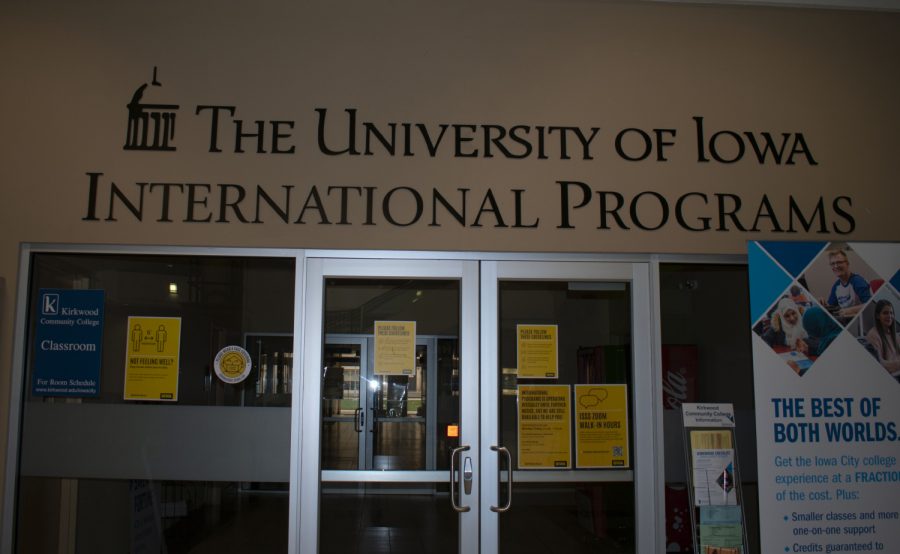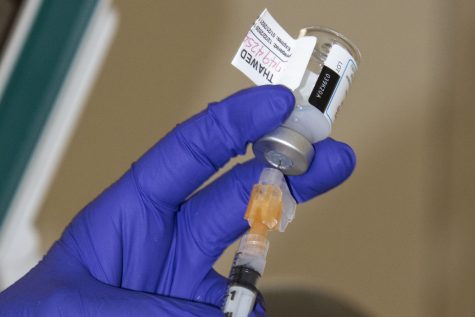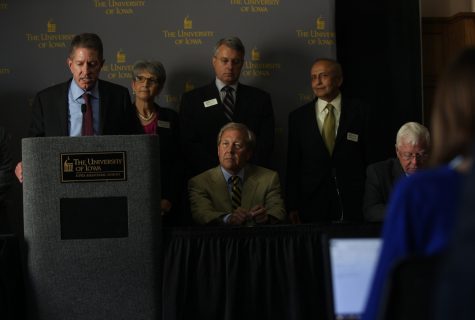Study abroad prioritizes virtual experiences, bringing back travel in the fall
International Programs develops new virtual global experiences and aims to send students abroad again in the fall.
The University of Iowa International Programs office is seen on March 28, 2021 in the Old Capitol Mall.
March 30, 2021
When University of Iowa junior Linette Leng embarked for Spain in spring 2020, she anticipated staying for nearly eight months and completing two different experiences abroad.
But when Leng got recalled home after just two months, she had to find a new way to use her Gilman scholarship — a grant that helps undergraduate students study abroad.
Leng said that, after a discussion with her study-abroad adviser, she decided to use the scholarship to do a virtual internship through University Studies Abroad Consortium during fall 2020.
According to the UI International Programs 2020 annual report, Leng is one of 24 students who participated in virtual global internships between the summer and fall of 2020.
With undergraduate student travel at the UI on hold through at least Aug. 1, International Programs is continuing to develop virtual programming and plans for the future, like Leng’s experience.
The in-person and virtual experiences were similar in the sense that they both gave Leng a chance to learn a foreign system and gain a new perspective on how America runs, she said.
“I wouldn’t put one over the other because my virtual internship really taught me time management and learning responsibility and discipline,” Leng said.
UI Associate Provost and Dean of International Programs Russell Ganim said the international-programs office is currently continuing to focus on virtual programming.
International Programs had four successful winterim, virtual, faculty-led courses, Ganim said, which were fully subscribed and received positive course evaluation feedback. Seventy-nine students in total registered to participate in them, according to the report.
“We think we’ve hit on a really good formula. We’ve got very active, creative faculty who are fully engaged in either creating new courses within the virtual format or updating existing ones,” he said. “That’s going to be the plan moving into the summer is that, since we really aren’t going to be sending students abroad in the summer, we nonetheless have seven faculty-led virtual courses in the pipeline.”
International programs will most likely continue to maintain a virtual presence, with a mix of in-person, hybrid, and live-streamed events, Ganim said.
For study-abroad financials, Ganim said International Programs is not running negative balances, but will have to start sending students abroad next fall to make up the lost ground they have experienced for what will be a year and a half of no in-person programming.
In an email to The Daily Iowan, Joan Kjaer, director of communications and constituent relations for UI International Programs, wrote that International Programs cannot predict what student behavior would have been without the pandemic.
“What we can say is that a year ago we brought home over 300 UI students that were studying abroad, and right now we have no UI students studying abroad,” Kjaer wrote.
According to the report, 692 UI students studied abroad in the academic year of 2018-19.
Realistically, Ganim said he thinks there will be a gradual return to normal with respect to international travel in the fall.
“It really won’t be until early 2022 that we returned to sort of the volume and frequency of travel that we saw before the pandemic,” Ganim said.
International Programs is in the process of envisioning what students will need for future travel as a result of the pandemic. Ganim said right now, the office anticipates students who travel internationally will be required to have proof of a negative COVID-19 test result and/or vaccination.
In an email to the DI, Autumn Tallman, associate director of international health, safety and security for International Programs, wrote that study abroad gives careful consideration to U.S. Department of State and Centers for Disease Control and Prevention recommendations.
“We can expect travel guidance from those sources and travel restrictions from foreign governments to vary from country to country, as the pandemic evolves and vaccination efforts continue,” Tallman wrote.
While some of the students who enroll in international courses are those that would have studied abroad otherwise, Tallman wrote, other participants noted that they may not have studied abroad if it had not been offered virtually — whether because of family or work commitments here — and that they were especially grateful for the remote experience.
Though students enrolled in virtual study abroad experiences don’t get the opportunity to travel, they still learn about different cultures and meet people in a variety of different fields from all over the world, Tallman added.
“Depending on the course theme, students may interact with writers and artists, medical staff, business professionals, archeologists or other professionals in a field of interest to them,” she wrote. “Our virtual students are making meaningful connections worldwide that can lead to future opportunities.”
Working under an Italy-based doctor, Leng said she assisted in a variety of different projects related to her Health Sciences degree for about 12 to 15 hours a week as a part of her virtual internship.
“Of course, traveling and living overseas is an irreplaceable experience,” Leng said. “But you know, with the current pandemic that we live in I think it’s the best opportunity that you can have to have international, global experience.”




















